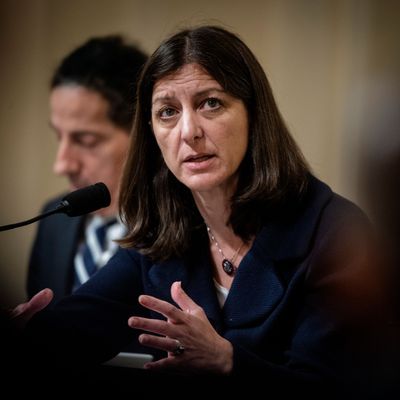
Representative Elaine Luria was sipping sweet peach tea in her office last week while C-SPAN on mute aired the House debate over holding two of Donald Trump’s former aides in contempt of Congress. Days earlier, the Virginia Democrat had voted with other members of the committee investigating the attack on the Capitol to force Peter Navarro and Dan Scavino to comply with subpoenas. The vote led Republican leader Kevin McCarthy to denounce her by name on the House floor, where he also derided the committee as “a political show trial” and “a disgusting betrayal of the Constitution and the Bill of Rights.”
The level of attention Luria has received as a second-term lawmaker on the committee has taken her by surprise, even after fighting two close, competitive elections. “I’m a Democrat who’s run twice in a Republican district. So I’m pretty used to people scrutinizing, criticizing everything that I do and say. But I mean, this is a little different in the fact that it’s in a continuous, 24-hour news cycle,” she said. Luria added that she’s learned to be “very judicious” in choosing her words, “because people are so desperate to get a story out of this that one little piece of information can get blown into something that can make 10 or 20 articles, when in fact it’s not even substantive.”
The appetite for news has been voracious. After a quiet few months, some of the committee’s investigation has begun to leak out to the public, such as the seven-hour gap in White House call logs on the day of the attack on the Capitol and the revelation that Ginni Thomas, the wife of Justice Clarence Thomas, had been directly lobbying White House officials on how to overturn the 2020 election. Behind the scenes, the committee has heard testimony from about 800 people and is getting ready to present its findings to the public in televised hearings as soon as next month.
“We can’t continue that indefinitely, just each witness leading to more people,” Luria said. “So we really are sensitive to the timeframe that the American people want to hear the body of our work and want to understand the facts surrounding January 6th. It’s our focus now to get to that point where we’re ready to present the information that has been collected through the course of the investigation.”
Luria predicted the hearings will change minds when the public is presented with the scheme “in its entirety, and understood how much of a concerted, deliberate effort there was and how many people at high levels of government were involved in trying to implement a plot that was going to change the outcome of the election.” She thought that if the committee laid out what it found, “it will have a very far reach,” like what happened during the congressional hearings into Watergate.
While the Virginia Democrat wouldn’t go into details about what the committee has found, Luria said it’s been jarring to learn how near the plotters came to success. “The most concerning part to me is to know how close we were to a different outcome,” she said. “If a few people had not been in the right place and done the right thing, like the former vice-president, for example.” Especially surprising to her was the brazen “public display” of the scheme, such as coming up with fake pro-Trump electors. “There are things that are shocking, sort of the extent to which people went to carry out this plan, although good judgment and logic would tell any average person that there was no legal basis to overturn the election,” she said.
Luria gained attention for publicly calling out the Justice Department for what she said was slow-walking charges against Mark Meadows, the former White House chief of staff, for being held in contempt of Congress for disobeying a committee subpoena. “Attorney General Garland, do your job so that we can do ours,” she intoned at a public hearing. During last week’s interview, she was more circumspect. “We do understand and respect the fact that there are three independent branches of government,” she said of the Justice Department. “We can voice opinions, frustrations with the speed, but we are not in any way trying to change an outcome of what they do. It’s really just, ‘Hey, we got a timeline over here. You guys be cognizant of that over there.’”
A retired U.S. Navy commander who represents Hampton Roads, Virginia, and its sprawling naval base, Luria views the committee’s investigative process the same way the Navy investigates an accident. “What’s the error chain? Where could you have inserted one thing in there that could have stopped this sort of reaching the ultimate point that it did, where we had a riot at the Capitol?”
The answer in this case is more complicated. “I think there’s lots of points where it could have stopped,” she said. “So there were people that were pushing this conspiracy and this big lie, but there were lots of people enabling that. There were lots of people who could have stood up earlier and spoken against it.”





























